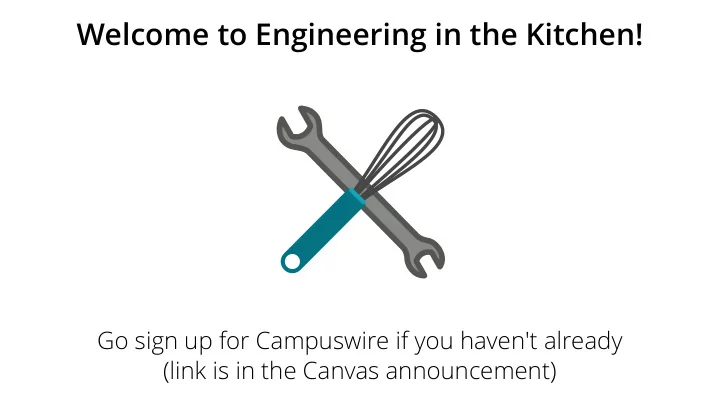

Welcome to Engineering in the Kitchen! Go sign up for Campuswire if you haven't already (link is in the Canvas announcement)
EN 1-24: Engineering in the Kitchen Steven Bell 9 September 2020
About me Bachelor's in Computer Engineering MS/PhD in Electrical Engineering Two summer-long internships
BUMPS AHEAD Warning! This is a brand-new course. Also, COVID. There will be problems - please be patient. And let us know how we can improve!
Electrical Engineering Taking things apart This course Food and cooking
About you Go write on the Google Doc: why are you interested in this course?
Teaching sta ff Mels Burns Melissa Rowland Joe Reese Youssef Soliman
I want everyone to succeed in this class! And to have fun. We'll evaluate your learning based on what you can do, not on a curve against each other. If you're falling behind, please reach out and get help! Rarely does "working harder" solve the problem.
O ffi ce hours OH are for everyone! Walking o ffi ce hours are an experiment - come join!
A word on stereotypes
By the end of class today, you should be able to: Explain what voltage and current are, and how they are di ff erent Explain what resistance is Use Ohm's law to calculate V/I/R
Opposites attract e - e - e -
Electric fi eld Describes the force a positive charge will experience
Batteries and wire A chemical reaction produces charges, until it reaches equilibrium.
Connecting the wire Charges cancel, but the battery produces more, setting up a new equilibrium.
A fi eld in the wire The charge gradient produces an electric fi eld, which pushes current down the wire!
One way to think about a circuit: Marbulous - amazon.com
Current in the marble machine How many marbles roll through per second? Marbulous - amazon.com
Voltage in the marble machine How much does a marble drop from input to output? Marbulous - amazon.com
Current Current is charge per second past a point Measured in Coloumbs /second = Amps i 1
Work in an electric fi eld A B x We say that A has higher potential than B.
Work in a wire Voltage is di ff erence in electrical potential Measured in Joules/Coulomb = Volts
Circuit schematics A schematic is an abstraction for describing a circuit. Some elements you should know: Block Voltage Battery Switch element source
Flashlight schematic (Before all fl ashlights switched to LEDs) Switch Battery Light bulb
Circuit schematics It's important to be clear about what's connected and what is not: connected not connected connected connected (dot is only for clarity) A connected region is called a "node".
Congruent schematics There are many ways to draw the same circuit. Don't be fooled just because they appear di ff erent - check what connects to what! A B A B C D C D
Wrapping up Write on the Google doc: what is one question you have after today's class?
For next Monday Come to Sophia Gordon Hall Class is during lunch time, so feel free to bring food
Recommend
More recommend